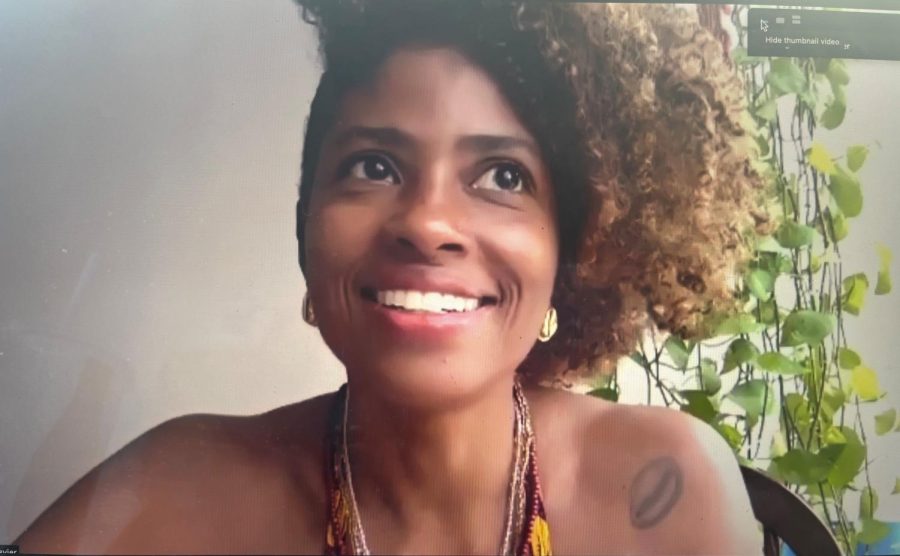Historian Giovana Xavier Discusses Black Beauty in Honor of BHM
The Freedom & Slavery Working Group invites Black feminist author to a Q&A centering around her book and research
ZOOM
Giovana Xavier talked about the experience of Black history and Black womanhood in Brazil as compared to in the U.S.
February 21, 2022
In honor of Black History Month, Fordham held a Q&A event with Black feminist author and historian Giovana Xavier on Feb. 10. Xavier received her doctorate in American history from one of the top-ranked universities in Brazil, Universidade Estadual de Campinas. She is also the organizer of the Black Women Intellectuals group at the Federal University of Rio de Janeiro School of Education.
The Freedom & Slavery Working Group hosted the Q&A event. Xavier spoke with Fordham Associate Professor of history Yuko Miki about her recent book, “The History of Black Beauty.”
Miki began the discussion by asking Xavier what inspired her to write about the history of Black beauty. Xavier said the book was heavily influenced by her personal experiences, starting with her first visit to the United States in 2009.
Her dissertation on Black beauty is a mix of a spiritual mission, historiographical knowledge and a political project.
“I started to see the relevance of beauty as a concept to Black community,” she said. “It is hard to explain in words, it is difficult, it is hard to cover this agenda in Brazilian historiography because it is so conservative in terms of concepts and methodology.”
Xavier also noted that her dissertation on Black beauty as a project is a mix of a spiritual mission, historiographical knowledge and a political project meant to illuminate Black women in history through a lens separate from pain, violence and dehumanization.
The conversation then moved to the nuances that come with speaking on issues of race and color in different cultures and languages. Xavier emphasized the importance of the translations making sense to both Brazil and U.S. audiences.
Xavier noted that her experience as a Black woman and a Brazilian is connected to the history of the U.S., which helped her contextualize from both an inside and outside perspective.
“At the same time it is an intersectional topic because I am on the outside in some way but I am also on the inside because I am a Black woman,” Xavier added. “I work with the documents through my Black experience.”
Miki then moved onto the historical context of “The History of Black Beauty,” which centers on the Great Migration and the Harlem Renaissance. Xavier discussed the series of Black families in the Great Migration and the documents she read.
“I had the opportunity to read the documents and the letters from migrants and think about this experience in terms of Black community,” Xavier said. “Many times in Brazil, we tried to imagine and construct stories through documents produced by white supremacists.”
“For me, it was important to show to Brazilian people all the versions of U.S. history.” Giovana Xavier, Black feminist author and historian
Xavier continued to speak of the misconceptions in Brazil regarding U.S. Black history and wanted to deconstruct this way of thinking.
“For me, it was important to show to Brazilian people all the versions of U.S. history,” she said. “There are many similarities, so I was interested to show this.”
Miki then moved the discussion to “pigmentocracy,” a word coined by Alejandro Lipschutz, a Chilean anthropologist, in 1944. Xavier used pigmentocracy to describe the hierarchy of skin tones between Black individuals. She mentioned the idea of a “Black bourgeoisie” to refer to Black individuals with lighter skin tones.
“The most challenging (thing) for me is not being Black and talking about Blackness, it’s the way I talk about Blackness.” Giovana Xavier
Miki asked, “How do you see these color or racial differentiations emerging in this new class of Black leaders?”
“Many times, I thought, ‘It’s really crazy to see the hierarchy inside Black communities, so how can I deal with the situation?’ Again, (in) my experience as a Black woman, I see this kind of situation all the time, so it’s so familiar … It’s a mix of motivations and situations, but I keep referring to a kind of creative process: How to create the possibility to (be) recognized as human beings in the context of situational demonization,” Xavier stated.
To close out the discussion, Miki opened the floor to the audience, allowing them to pose questions to Xavier. One attendee asked Xavier to speak on her experience as a Black woman in a university talking about Blackness.
“In Brazil, we don’t have many Black students doing post-graduate work and talking about their experiences,” the attendee said.
“Being a Black woman talking about Blackness is a challenge, of course … The most challenging (thing) for me is not being Black and talking about Blackness, it’s the way I talk about Blackness,” Xavier said. “We are always talking about the pain, the violence, the poor, … (but) I take another direction: I want to talk about the creative process. The poor, poverty is strongly related to the creative process.”















